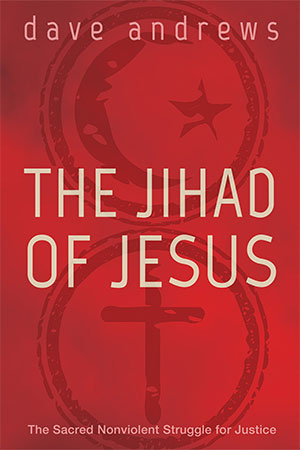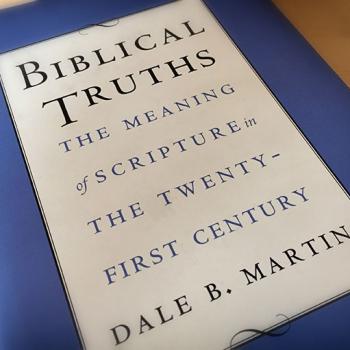 For many people, the word jihad is likely to conjure up images of bearded men wearing suicide vests, of black-robed militants brandishing AK-47s, or of clandestine terrorist cells plotting to overthrow the United States.
For many people, the word jihad is likely to conjure up images of bearded men wearing suicide vests, of black-robed militants brandishing AK-47s, or of clandestine terrorist cells plotting to overthrow the United States.
But what if, instead of representing violence, hate, war, and death, jihad was understood as a nonviolent struggle for peace, justice, understanding, and love?
In his book The Jihad of Jesus (Wipf & Stock, $22), Dave Andrews draws upon Christian and Muslim history, theology, tradition, and scripture in a quest to reclaim jihad as a powerful challenge for both Christians and Muslims “to practice the radical, alternative, participatory, empowering, nonviolent jihad of Jesus” (163).
Andrews readily acknowledges the checkered history of both these Abrahamic faiths, and offers a sobering and honest examination of the violence that has occurred in the name of Christ and Allah throughout history. This leads him to address an all-important question head-on:
“Are the atrocities that are done in the name of Christianity or Islam true indicators of the nature of Christianity or Islam, or not?” (53)
His answer to that question is one that he realizes many people will characterize as “heresy, even blasphemy” (71). Andrews believes that, yes, the cruelties perpetrated in the name of Christianity and Islam are not mere aberrations of inherently peaceful faiths, but instead are a natural out-working of the “closed set perspective” that currently defines those religions.
According to Andrews, “closed set” thinking entails a narrow and restrictive attitude toward religious belief that understands faith in terms of boundaries and differences. It is the perpetuation of this “mutually exclusive, inevitably conflictual, collision-bound bounded sets” (74) that leads to continual violence.
But though conflict and discord are currently woven into the fabric of Christianity and Islam, Andrews sees a way to move beyond our differences by embracing an “open set perspective of religion.” He writes:
“…we need to find another way of defining our faith that is not so defensive; another way of affirming our faith that is not so aggressive; a way of comprehending our faith that is true, but doesn’t pretend to have a monopoly on truth; and a way of interpreting our faith that is inclusive, not exclusive, of all that is good and healthy and holy and right in other cultures, traditions, and religions. And we can only do that, if we set aside a “closed set” perspective and embrace an “open set” perspective.” (75)
This “open set perspective” doesn’t ask the faithful to compromise their core beliefs, but does encourage us to focus on common ground, on shared perspectives, and on principles that allow us to work with each other toward common goals. In doing so, we can exchange the “not-so-holy” so-called “Holy Wars” for a nonviolent jihad that is characterized by a “whole-hearted strong-but-gentle struggle for justice against injustice” (103).
Andrews’ proposal for reclaiming jihad as a shared ideal of Muslims and Christians is grounded in the person of Jesus, as understood by both faiths. He views Jesus as the definitive exemplar of someone engaging in a nonviolent jihad for love and justice. Andrew shows how the principles of active and participatory nonviolent struggle espoused by Jesus have been realized in a variety of contexts, through the powerful examples of Francis of Assisi, Badshah Khan, Leyman Gbowee, and Muhammad Ashafa. In this respect, The Jihad of Jesus isn’t simply a reflection on our current fractured state of affairs, it is also a guidebook that proposes meaningful and practical foundations for true change.
As tensions between Muslims and Christians continue to escalate around the world, The Jihad of Jesus provides valuable context, insight, and clarity regarding interfaith relationships and serves as a clarion call to reconciliation and action.
Find out more about The Jihad of Jesus at at jihadofjesus.com and about Dave Andrews at daveandrews.com.au.
 Dan Wilkinson
Dan Wilkinson
Dan is the Executive Editor of the Unfundamentalist Christians blog. He is a writer, graphic designer and IT specialist. He lives in Montana, is married and has two cats.












